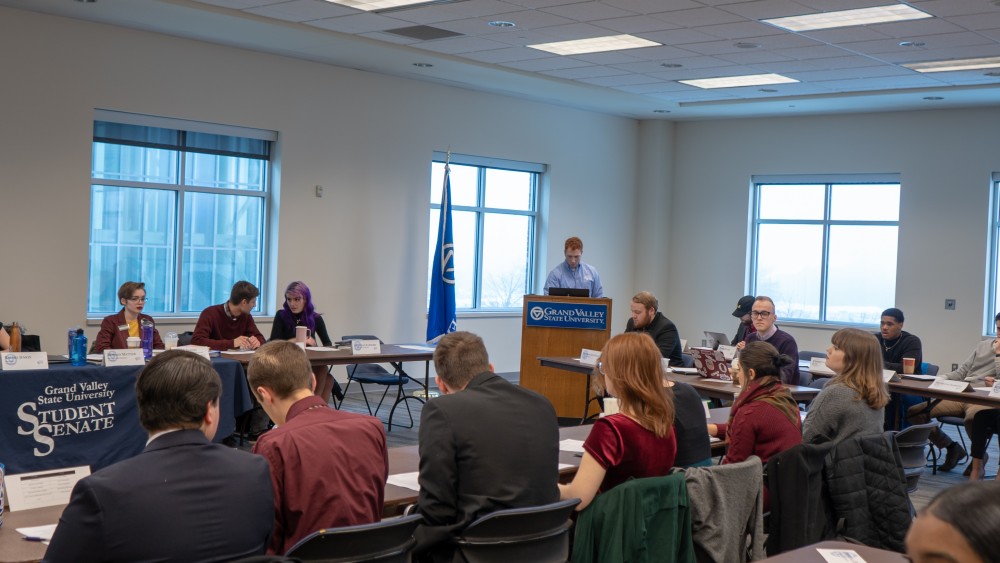Student senate approves 2019-2020 Student Life Fund budget

Student Senate. Student Senate Meeting. 4:30 p.m in Kirkhof, Pure Marquette Room. February 7th, 2019. Discussing ways in which to approve the conditions of GV Students in regards to the education system. GVL / Ben Hunt
Apr 1, 2019
At student senate’s general assembly on March 28, the 2019-2020 Student Life Fund (SLF) allocations were approved for over 20 campus councils and events, which is then distributed to almost 400 campus organizations across Grand Valley State University. SLF is compiled of over $1 million from GVSU’s general fund and housing and dining.
“The full general assembly votes on this budget as far as how this amount of money gets broken into each year,” said Office of Student Life Assistant Krista McFarland.
While senate may approve the budget, not all body members know of each request that is factored into the final spreadsheet. Senate places its faith in the budget’s effectiveness on Senate VP of Finance Amanda Crawford and the rest of the finance committee. Most senators are just seeing the final product now, following months of request reviews and comparisons to previous years by the finance committee.
The finance committee is actually compiled of two groups: the appropriations and the cultural funding boards who oversee their respective budget needs. In a trickle down-like method, each year’s million dollar SLF is broken down through allocations based on previous years’ needs and individual funding requests through the university’s online Lakerlink portal. These allocations and requests fund events like President’s Ball, the spring concert and campus organization programming.
The changes to this year’s budget included reducing funding to academic and professional groups, an increase to club and recreational sports as well as a rise in student media funding. Club and recreational sports were upped to $445,500 for the next fiscal year, both as means to provide safety equipment and to pay the salaries of coaches and training staff. The adjustments to the academic and professional have repeatedly gone down since the 2018 fiscal year, due to a lesser need for funding for those groups.
“We still have a lot of academic groups but their needs may not be to request funding, it might just be monthly meeting or speakers but it’s not something that requires funding for,” McFarland said.
According to McFarland, the adjustments to allocations are never a reflection of senate’s attitude toward a specific group or council, but solely based on the needs of campus organizations. Each year campus programming is different both as a result of a decline in funding requests and as organizations’ leadership change from year to year.
Senate’s approval of the 2019-2020 budget did come with some disagreements, however. Specifically the student media budget, which will reach over $100,000 next year to provide funding to Grand Valley Television (GVTV), WCKS The Whale radio station and the Lanthorn. While some senators voiced their concerns about this large allocation of money, others provided their support for student media and the opportunities they provide.
Despite the disagreements, the 2019-2020 was approved for the next fiscal year and will begin allocating funding next school year. One surprising change to the budget is a small drop in travel funding, from $85,300 to $83,500, which supports all travel for student organizations. This allocation has grown regularly in previous years due to increasing student travel engagement. The drop is the result of excess money from this year’s travel fund, which is then rolled back into senate’s reserve fund. While the total amount of the reserve fund is hard to pinpoint, in part due to senate pulling out $20,000 to cover the cancelled President’s Ball bill, money from the reserves is regularly used for a variety of reasons.
“We try to spend these budgets,” McFarland said. “So the reserve is kind of for contingency plans. Our goal is that that students receive this funding and that we don’t have a lot of reserve year to year.”
This budget, created with precision by Senator Amanda Crawford and the finance committee, reflects the needs of campus programming based on previous years and funding requests. While some allocation decisions my be harder than others, senate believes in the SLF budgeting process in providing support to campus programming at GVSU.
“(The) decisions that were made were based on use or the lack of requests coming from certain organizations in their field,” said Senate President Rachel Jenkin. “It’s all really based on the usage from these organizations.There’s definitely countless hours put into making up the budget.”
The finalized 2019-2020 budget can be viewed here.

























